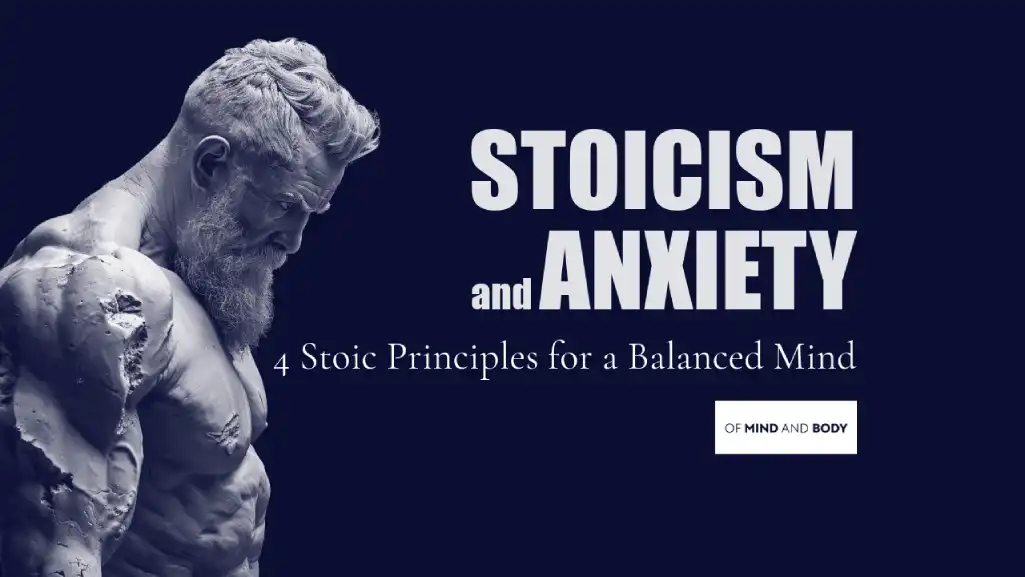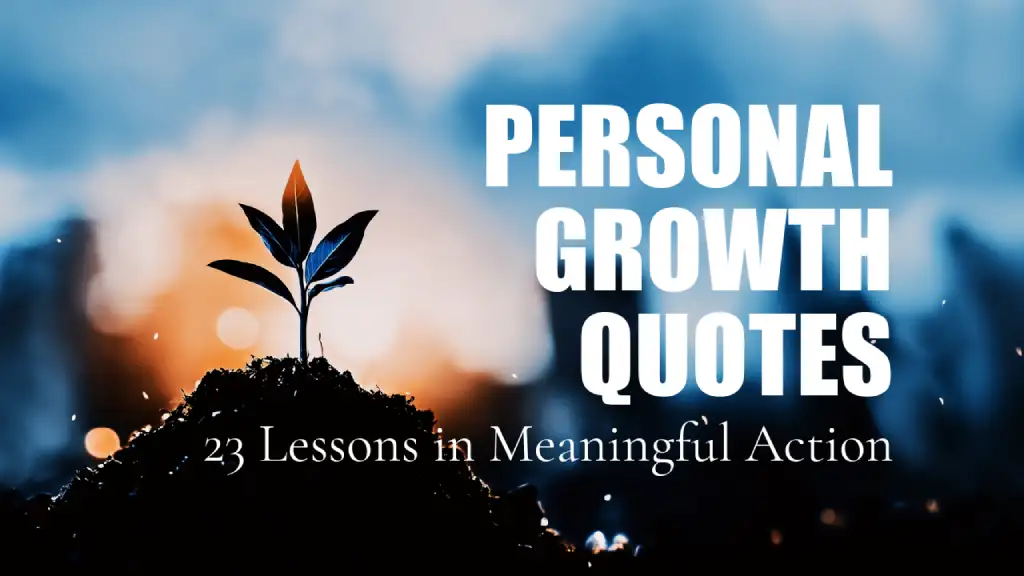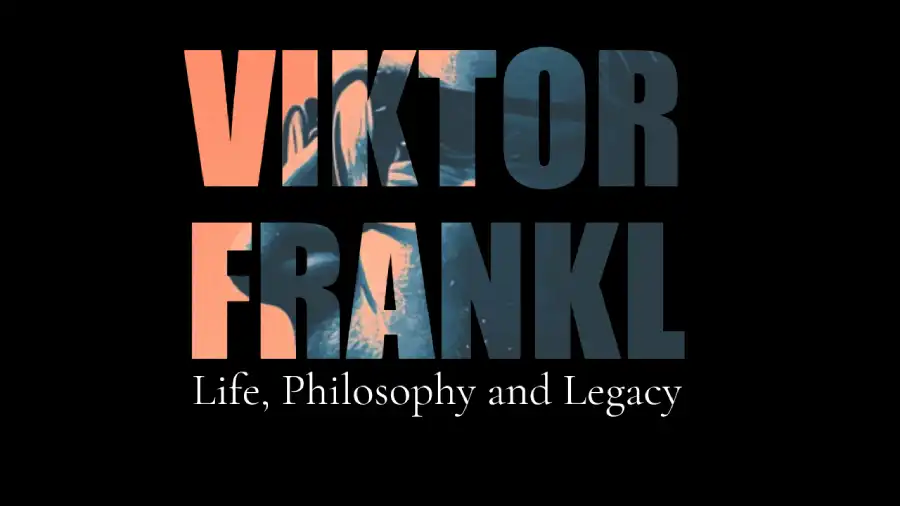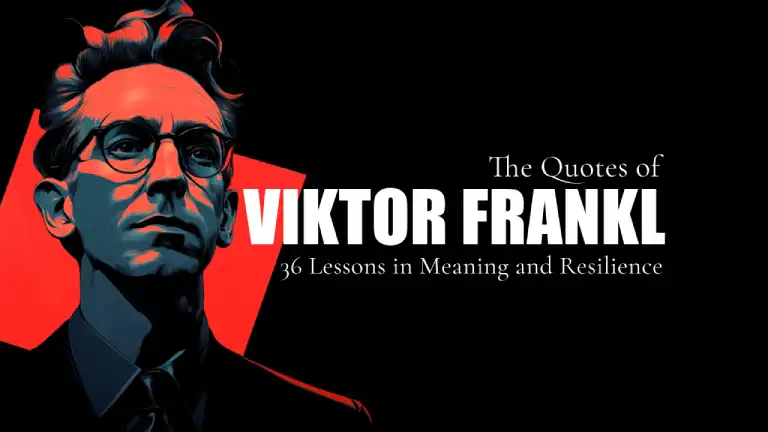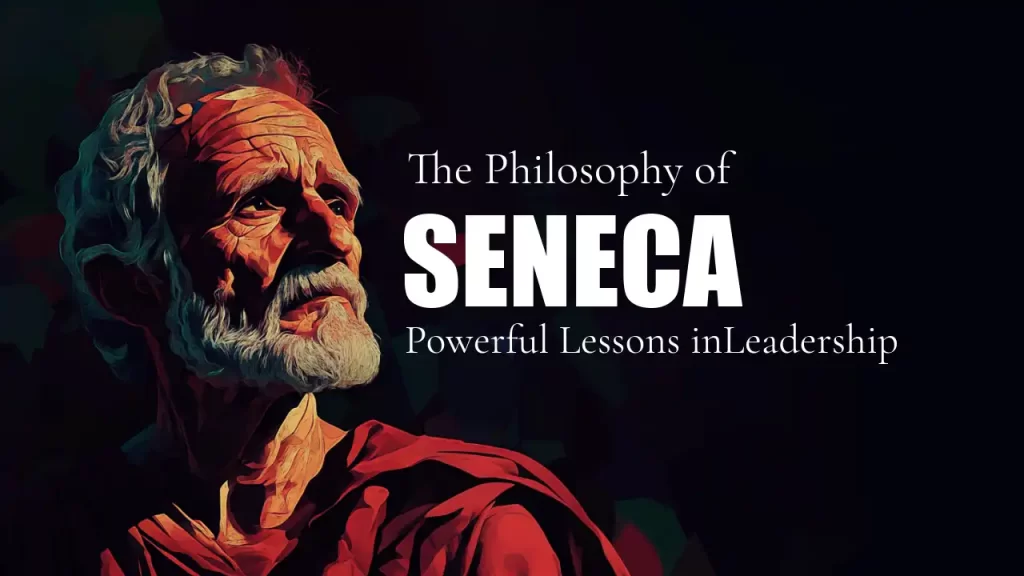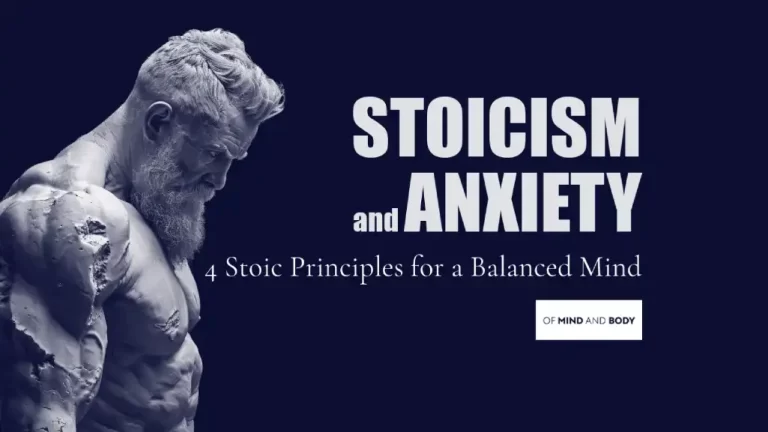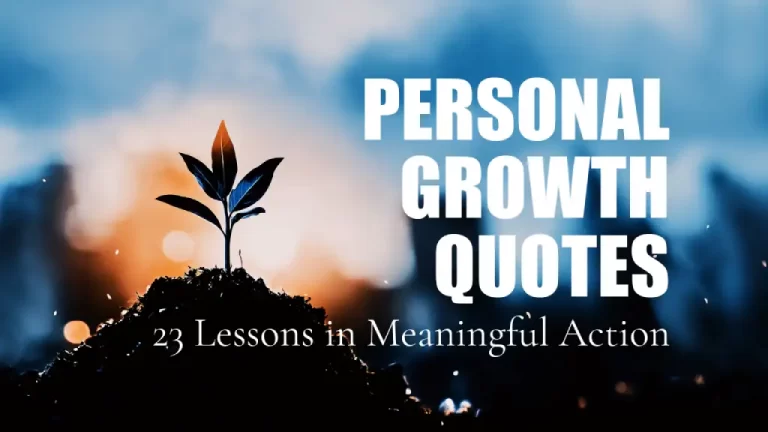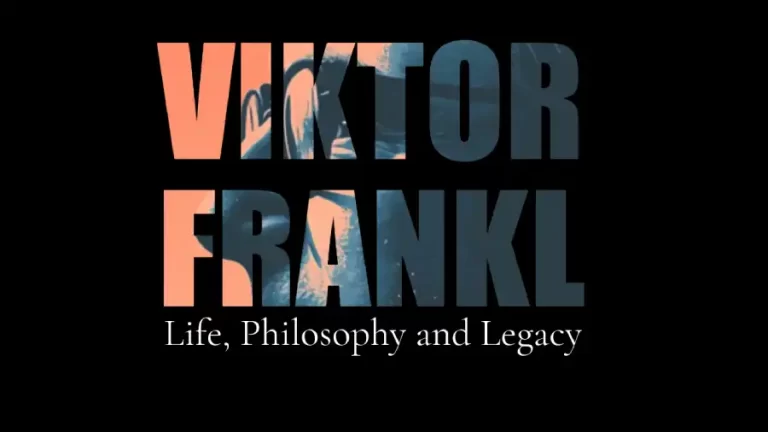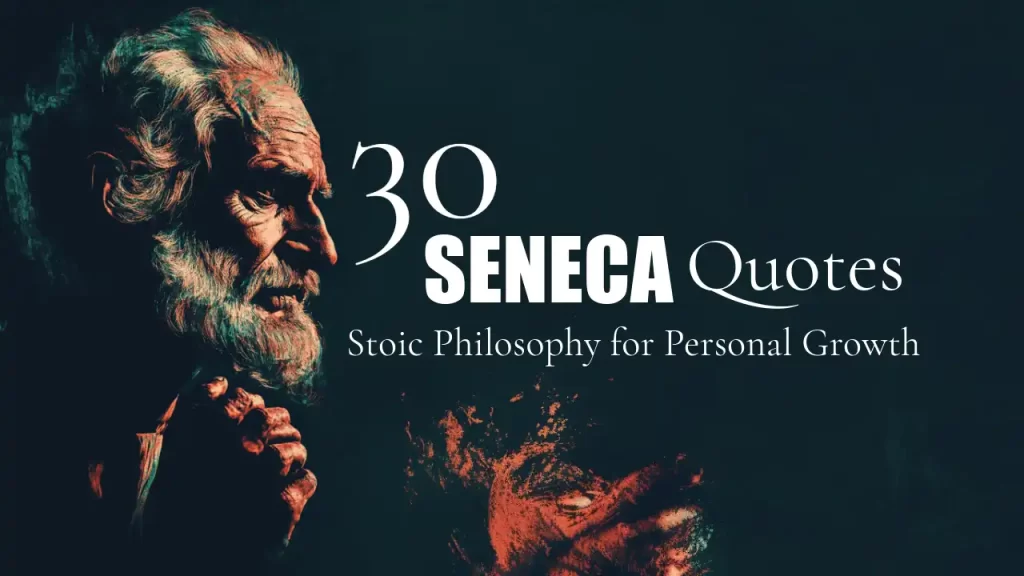
Seneca, one of the most influential Stoic philosophers, left behind a wealth of wisdom that continues to resonate in modern times. His teachings, captured in these Seneca quote, provides profound insights into how to live a life of resilience, purpose, and inner peace. Each Seneca quote is a reflection on adversity, happiness, and self-mastery, Seneca offers timeless guidance for navigating life’s challenges with grace and clarity. In this article, we explore 30 of his most powerful quotes, each offering a window into the enduring philosophy of Stoicism.
Click the quotes below to find out more:
- “It is not the man who has little, but he who desires more, that is poor.”
- “A good character is the only guarantee of everlasting, carefree happiness.”
- “Our plans miscarry because they have no aim. When a man does not know what harbour he is making for, no wind is the right wind.”
- “It is not that we have a short time to live, but that we waste a lot of it.”
- “The day which we fear as our last is but the birthday of eternity.”
- “He suffers more than necessary, who suffers before it is necessary.”
- “The bravest sight in the world is to see a great man struggling against adversity.”
- “Life, if well lived, is long enough.”
- “There is no easy way from the earth to the stars.”
- “You want to live – but do you know how to live? You are scared of dying – and, tell me, is the kind of life you lead really any different from being dead?”
- “To bear trials with a calm mind robs misfortune of its strength and burden.”
- “A gem cannot be polished without friction, nor a man perfected without trials.”
- “We are more often frightened than hurt; and we suffer more from imagination than from reality.”
- “I judge you unfortunate because you have never lived through misfortune. You have passed through life without an opponent—no one can ever know what you are capable of, not even you.”
- “It is a rough road that leads to the heights of greatness.”
- “Sometimes even to live is an act of courage.”
- “It is the power of the mind to be unconquerable.”
- “It does not matter what you bear, but how you bear it.”
- “The greatest remedy for anger is delay.”
- “No person has the power to have everything they want, but it is in their power not to want what they don’t have.”
- “Difficulties strengthen the mind, as labour does the body.”
- “Anger, if not restrained, is frequently more hurtful to us than the injury that provokes it.”
- “If you really want to escape the things that harass you, what you’re needing is not to be in a different place but to be a different person.”
- “Life is like a play: it’s not the length, but the excellence of the acting that matters.”
- “Luck is what happens when preparation meets opportunity.”
- “No man was ever wise by chance.”
- “What I advise you to do is, not to be unhappy before the crisis comes.”
- “Wild animals run from the dangers they actually see, and once they have escaped them worry no more. We however are tormented alike by what is past and what is to come.”
- “True happiness is… to enjoy the present, without anxious dependence upon the future.”
- “But life is very short and anxious for those who forget the past, neglect the present, and fear the future.”
1.
“It is not the man who has little, but he who desires more, that is poor.”
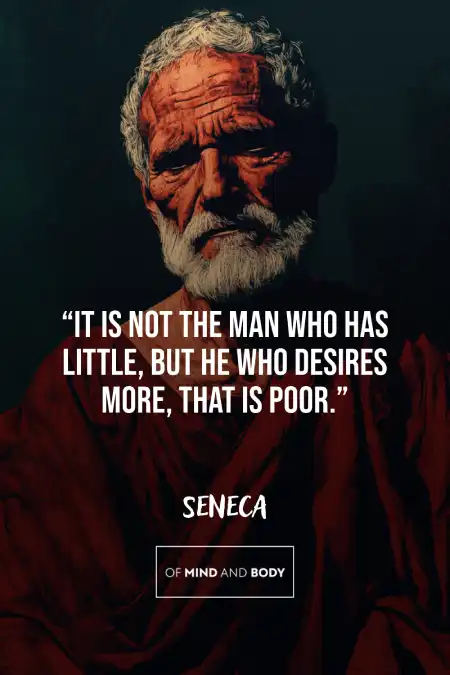
The Wisdom Behind the Words:
This Seneca quote emphasises the Stoic belief that wealth and poverty are not measured by material possessions but by the mind’s contentment. True poverty comes from an insatiable desire for more, as it leads to constant dissatisfaction. The wisdom here is that by moderating our desires and appreciating what we have, we achieve a richer, more fulfilling life. The focus shifts from external accumulation to internal peace, suggesting that wealth lies in controlling our wants rather than chasing more possessions.
Modern-Day Application:
In a consumer-driven society where success is often equated with material wealth, this Seneca quote serves as a reminder to reassess what truly matters. Modern minimalism echoes this Stoic principle, encouraging people to focus on contentment with less rather than pursuing more. By practicing gratitude and curbing unnecessary desires, we can avoid the cycle of constant consumption and live a life of greater peace and satisfaction. This mindset fosters inner wealth, where fulfilment comes from appreciating the present rather than endlessly seeking external validation.
2.
“A good character is the only guarantee of everlasting, carefree happiness.”

The Wisdom Behind the Words:
This Seneca quote highlights the Stoic belief that true happiness comes not from external circumstances but from cultivating virtue and good character. Seneca argues that a strong moral foundation, built on virtues like integrity, kindness, and wisdom, provides lasting peace of mind and joy. A person with good character remains untroubled by external events because their happiness is rooted in their actions and values, not in fleeting pleasures or material gains.
Modern-Day Application:
In today’s world, where external success is often prioritised over internal character, this Seneca quote is a call to focus on personal virtues. True happiness is not found in achievements or possessions but in being a person of integrity and kindness. By nurturing good character through honesty, empathy, and self-discipline, we can experience a deeper, more sustainable form of happiness. This approach aligns with the growing focus on emotional intelligence and self-awareness, showing that character, rather than external success, is the foundation of a fulfilling life.
3.
“Our plans miscarry because they have no aim. When a man does not know what harbour he is making for, no wind is the right wind.”

The Wisdom Behind the Words:
In this Seneca quote, the philosopher warns against the dangers of drifting through life without clear goals. Without a defined purpose or aim, efforts become scattered, and even favourable circumstances go to waste. The wisdom here lies in the importance of having clear, meaningful objectives. Seneca emphasises that success and fulfilment require a sense of direction, much like a sailor needs to know their destination to navigate effectively.
Modern-Day Application:
In today’s fast-paced world, where distractions abound and people often find themselves lost or overwhelmed, this Seneca quote reminds us of the importance of setting clear, purposeful goals. Whether in career, personal growth, or relationships, having a defined aim helps guide our decisions and focus our energy.
Setting intentions and staying committed to them allows us to move forward with purpose, rather than being swayed by external forces. This advice aligns with modern productivity strategies, such as goal setting and intentional living, which stress the importance of having a clear vision to achieve success.
4.
“It is not that we have a short time to live, but that we waste a lot of it.”
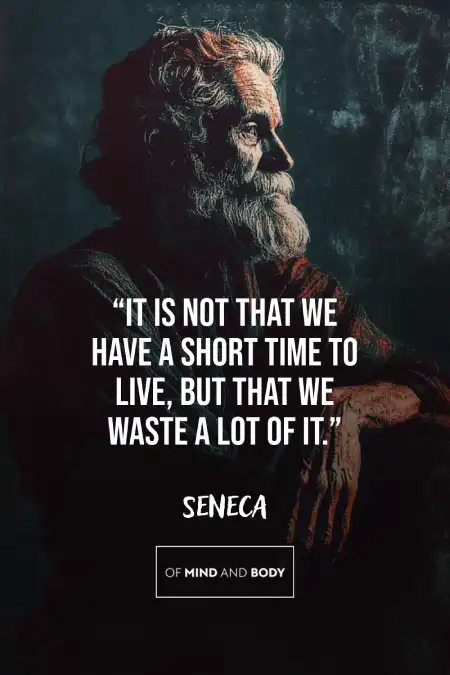
The Wisdom Behind the Words:
This Seneca quote reflects a core Stoic principle about time: that life is not inherently short, but our misuse of it makes it seem so. The philosopher argues that we often squander time on trivial or unimportant pursuits, rather than using it wisely to live a meaningful and virtuous life. The quote encourages mindfulness and the conscious use of time, urging us to focus on what truly matters and avoid distractions that drain our energy and attention.
Modern-Day Application:
In a world where time feels increasingly scarce, this Seneca quote offers valuable insight into how we can better manage our lives. With the distractions of social media, entertainment, and constant notifications, it’s easy to feel like there’s never enough time. By practicing mindfulness and being intentional with how we spend our time, we can avoid wasting it on meaningless activities and instead invest it in personal growth, relationships, and pursuits that bring true fulfilment. Time management techniques like prioritising tasks and setting boundaries can help align with this Stoic wisdom, leading to a more focused and productive life.
5.
“The day which we fear as our last is but the birthday of eternity.”
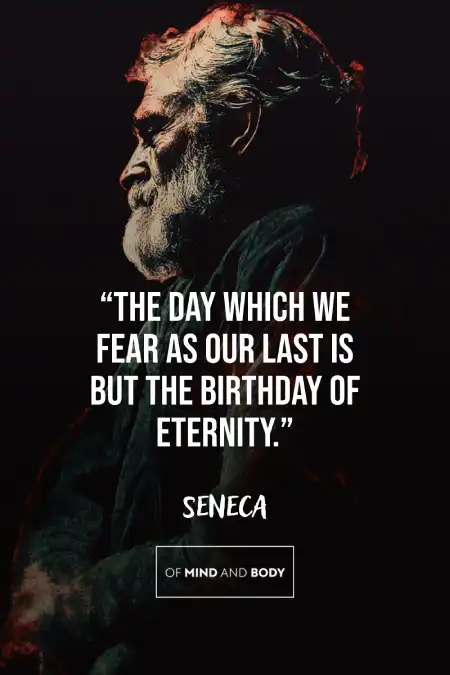
The Wisdom Behind the Words:
This Seneca quote offers a Stoic perspective on death, encouraging us to view it not as an end but as a transition into something eternal. Seneca, like other Stoic philosophers, believed that death should not be feared but accepted as a natural part of life. The quote reflects a deeper understanding of mortality, suggesting that death is not something to dread but a passage to an eternal state, whatever that may be. By accepting death, we free ourselves from the anxiety that often clouds our experience of life.
Modern-Day Application:
In modern times, where death is often feared or avoided as a topic of discussion, this Seneca quote provides a more peaceful perspective. It encourages us to embrace our mortality, which can lead to a more meaningful and intentional life. Rather than living in fear of the inevitable, we can focus on living fully in the present, appreciating each day as it comes. This approach resonates with mindfulness and the growing acceptance of death as part of life, helping us reduce anxiety and find peace with the natural cycle of life.
6.
“He suffers more than necessary, who suffers before it is necessary.”
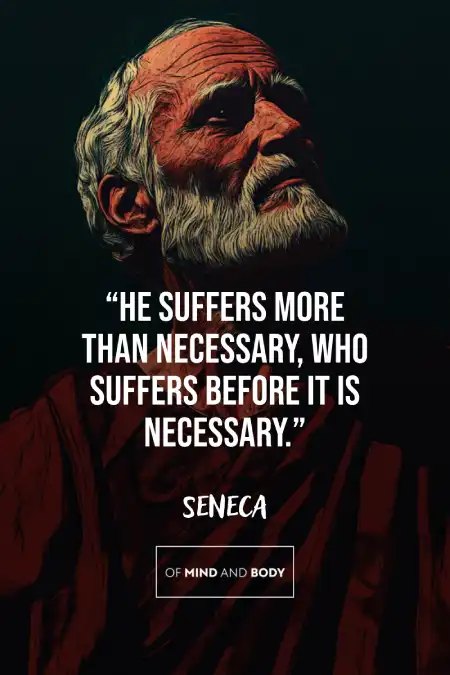
The Wisdom Behind the Words:
This Seneca quote speaks to the Stoic emphasis on avoiding unnecessary suffering by not worrying about the future. The wisdom here lies in the understanding that much of our suffering comes not from present difficulties but from anxieties about potential future problems. By worrying in advance, we experience pain twice: once in anticipation and again if the event actually happens. Seneca encourages us to focus on the present and face challenges as they come, rather than letting fear and worry magnify our suffering.
Modern-Day Application:
In today’s world, where anxiety about the future is common, this Seneca quote is a reminder to stay grounded in the present. Worrying about what might happen—whether related to health, finances, or relationships—often causes unnecessary stress. Mindfulness practices, such as meditation or deep breathing, help cultivate an awareness of the present moment, reducing anticipatory anxiety. By focusing on the “now” and trusting our ability to handle challenges when they arise, we can minimise unnecessary suffering and live with greater peace of mind.
7.
“The bravest sight in the world is to see a great man struggling against adversity.”
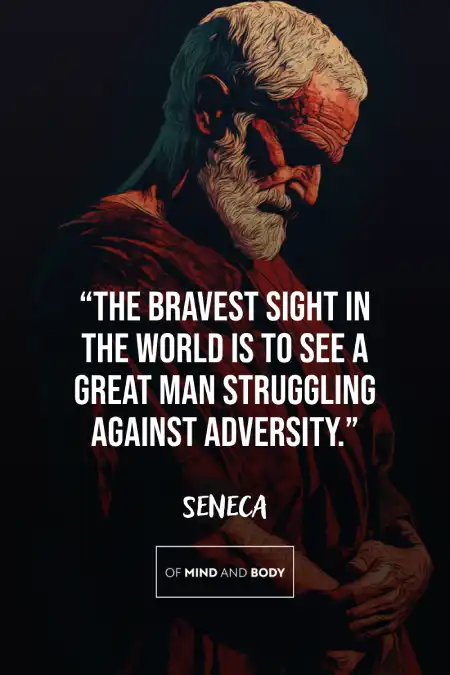
The Wisdom Behind the Words:
This Seneca quote reflects the Stoic admiration for resilience and courage in the face of adversity. The true mark of greatness, according to Seneca, is not avoiding hardship but enduring and overcoming it with dignity and strength. Struggling against adversity reveals a person’s character and virtues, making it one of the most admirable and inspiring human traits. The wisdom here is that adversity is not something to be feared but an opportunity to demonstrate courage and resilience.
Modern-Day Application:
In our modern context, this Seneca quote serves as an encouragement to embrace challenges rather than shy away from them. Whether it’s overcoming personal hardships, professional setbacks, or societal obstacles, resilience is a quality that earns respect and admiration. Today, we celebrate individuals who rise above difficulties, from athletes recovering from injury to entrepreneurs who face failure before success. This quote reminds us that enduring adversity with grace not only strengthens our character but also serves as an inspiration to others.
8.
“Life, if well lived, is long enough.”

The Wisdom Behind the Words:
Seneca challenges the common notion that life is too short, arguing instead that a life lived with purpose and virtue is always sufficient, regardless of its length. The wisdom in this quote is in the understanding that the quality of our life, not its duration, is what truly matters. By focusing on living well—through meaningful actions, personal growth, and virtuous behaviour—we ensure that even a seemingly short life can be fulfilling and complete.
Modern-Day Application:
In modern society, where there is often a focus on extending life through medicine and technology, this Seneca quote reminds us to prioritise how we live rather than how long we live. It encourages us to focus on leading a meaningful, purposeful life rather than simply extending our years. Practices such as mindfulness, living with intention, and focusing on relationships and personal growth help ensure that our time on Earth, no matter how long, is rich and fulfilling. The goal is to live well, not merely to live long.
9.
“There is no easy way from the earth to the stars.”
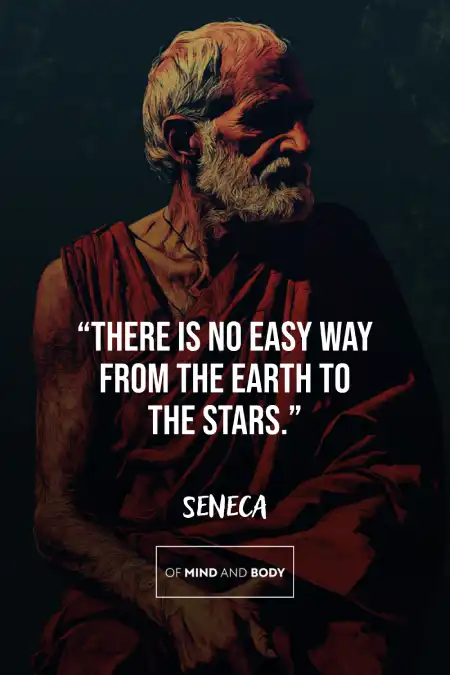
The Wisdom Behind the Words:
This Seneca quote underscores the Stoic belief that achieving greatness, success, or lofty goals requires hard work, perseverance, and overcoming obstacles. The journey to reach our highest aspirations is never easy or straightforward, and challenges are inevitable. The wisdom here is in recognising that struggle is a necessary part of achieving anything worthwhile. This quote serves as a reminder that the path to success is often long and difficult, but it is through persistence and effort that we reach our goals.
Modern-Day Application:
In the modern world, where instant gratification and quick success are often glorified, this Seneca quote reminds us that real achievement requires time, effort, and perseverance. Whether pursuing career goals, personal ambitions, or self-improvement, the journey is often difficult, and setbacks are inevitable. This quote encourages us to embrace the challenges along the way, knowing that they are an essential part of reaching our “stars.” It resonates with modern ideals of grit and resilience, which emphasise the value of persistence in the face of difficulty.
10.
“You want to live – but do you know how to live? You are scared of dying – and, tell me, is the kind of life you lead really any different from being dead?”

The Wisdom Behind the Words:
In this Seneca quote, he challenges us to reflect on the quality of our life, questioning whether we are truly living or merely existing. Many people fear death, yet they may not be making the most of their lives.
Seneca urges us to embrace life fully, living with purpose, joy, and awareness, rather than simply going through the motions. The wisdom here is that fearing death while not living a meaningful life is paradoxical—what we should fear is not death but a life wasted.
Modern-Day Application:
In today’s fast-paced world, where people often fall into routines without truly engaging with life, this Seneca quote calls for a deeper reflection on how we live. Many individuals may fear death, but they also fail to fully embrace the present moment, spending time on trivial pursuits rather than living intentionally.
This quote encourages us to prioritise experiences, relationships, and personal growth over mere survival. By asking ourselves whether we are truly living or just existing, we can make changes to live a more fulfilling, vibrant life.
11.
“To bear trials with a calm mind robs misfortune of its strength and burden.”

The Wisdom Behind the Words:
This Seneca quote reflects a core Stoic teaching about the importance of maintaining calm and composure in the face of adversity. The wisdom here lies in the understanding that our reaction to difficulties determines their power over us. By approaching challenges with a calm and rational mind, we diminish the emotional weight of the misfortune and reduce its impact on our well-being. This mindset not only helps us endure hardships but also allows us to navigate them more effectively.
Modern-Day Application:
In today’s stress-filled world, this Seneca quote offers valuable insight for managing challenges. Whether dealing with personal setbacks, professional difficulties, or global crises, maintaining a calm mind can help alleviate the emotional burden of these situations. Mindfulness techniques, meditation, and stress management strategies align with this Stoic principle, teaching us to remain composed and focused, even in difficult times. By practicing calmness, we regain control over our responses and reduce the power that misfortune holds over our lives.
12.
“A gem cannot be polished without friction, nor a man perfected without trials.”

The Wisdom Behind the Words:
This Seneca quote uses the metaphor of a gem to illustrate that just as friction polishes a gemstone, personal growth and character are shaped by trials and challenges. The wisdom here is that adversity is essential for development. Without difficulties, we cannot refine our virtues, strengthen our resilience, or fully realise our potential. Trials, while uncomfortable, are necessary to become a better version of ourselves.
Modern-Day Application:
In modern life, where the desire for comfort and ease often overshadows personal growth, this Seneca quote reminds us that challenges are an essential part of self-improvement. Whether it’s career setbacks, personal struggles, or emotional hardships, these experiences refine and strengthen us, much like friction polishes a gem. Instead of avoiding adversity, we can embrace it as an opportunity for growth. This mindset aligns with the concept of “post-traumatic growth,” which suggests that overcoming adversity can lead to profound personal transformation.
13.
“We are more often frightened than hurt; and we suffer more from imagination than from reality.”
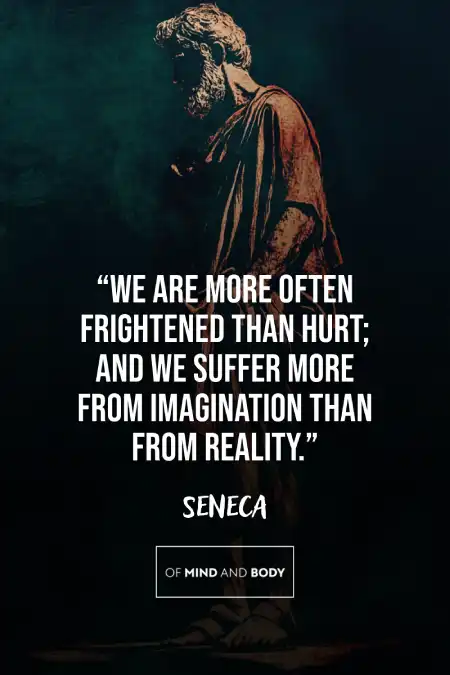
The Wisdom Behind the Words:
Seneca points out that much of our suffering is self-inflicted, originating not from actual events but from our fears and anxieties about what might happen. The wisdom in this Seneca quote lies in recognising that our imagination often amplifies fear and pain, making things seem worse than they actually are. By distinguishing between real problems and imagined fears, we can reduce unnecessary suffering and regain control over our emotional well-being.
Modern-Day Application:
In the modern world, where anxiety and worry are common, this Seneca quote is especially relevant. Many people experience stress and fear about future events that may never come to pass, causing them to suffer unnecessarily. Practices such as cognitive behavioural therapy (CBT) and mindfulness help address this issue by teaching us to focus on the present and challenge irrational fears. By doing so, we can distinguish between what is real and what is imagined, reducing fear and anxiety and living a more peaceful life.
14.
“I judge you unfortunate because you have never lived through misfortune. You have passed through life without an opponent—no one can ever know what you are capable of, not even you.”

The Wisdom Behind the Words:
In this Seneca quote, the philosopher argues that a life without challenges is unfortunate because it prevents personal growth and self-discovery. Seneca believes that misfortune acts as an opponent that tests our abilities, and without these trials, we can never truly know what we are capable of achieving. The wisdom here is that difficulties reveal our strengths and weaknesses, allowing us to grow and understand ourselves better.
Modern-Day Application:
In today’s world, where many strive to avoid hardship, this Seneca quote reminds us that adversity is essential for growth and self-awareness. People who face challenges and overcome them often emerge stronger, wiser, and more resilient. Without these tests, we may never fully realise our potential. This perspective encourages us to view hardships not as misfortune but as opportunities for personal development, pushing us to discover our true capabilities in the face of adversity.
15.
“It is a rough road that leads to the heights of greatness.”

The Wisdom Behind the Words:
This Seneca quote highlights the idea that achieving greatness is never easy; it requires enduring hardships and facing obstacles along the way. The wisdom here is that the path to success, virtue, or personal excellence is often difficult, and those challenges are what make the journey worthwhile. The “rough road” symbolises the trials and tribulations necessary to reach greatness, and it is through persistence and resilience that we rise to new heights.
Modern-Day Application:
In a world where success is often glamorised, this Seneca quote serves as a reminder that the journey to greatness is filled with challenges. Whether in personal development, professional success, or creative endeavours, setbacks and obstacles are part of the process. This quote encourages perseverance, teaching us that the rough road is not something to avoid but an essential part of achieving our highest potential. By embracing the difficulties along the way, we can reach new levels of accomplishment and self-realisation.
16.
“Sometimes even to live is an act of courage.”

The Wisdom Behind the Words:
This Seneca quote acknowledges the profound struggles people face, suggesting that, in certain moments, simply continuing to live requires immense courage. The wisdom here is in recognising that life itself can be a difficult journey, and enduring its challenges, pain, or sorrow is often a brave act in itself. Seneca honours the strength it takes to persevere when faced with overwhelming circumstances, viewing survival as an admirable feat of courage.
Modern-Day Application:
In the modern world, where mental health challenges like depression, anxiety, and burnout are increasingly common, this Seneca quote offers a validating perspective. It reminds us that enduring tough times—whether emotional, physical, or existential—requires strength and resilience. For many, simply getting through the day can feel like a monumental task, and Seneca’s words provide encouragement and honour the courage it takes to keep going. This quote resonates with those struggling silently, reminding them that survival in itself is a courageous act.
17.
“It is the power of the mind to be unconquerable.”
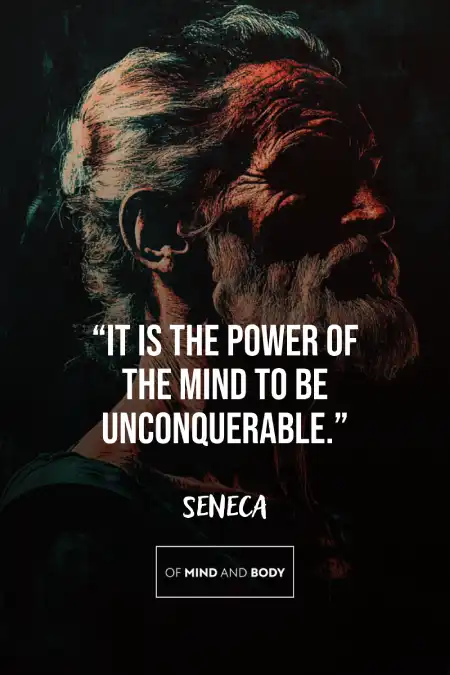
The Wisdom Behind the Words:
This Seneca quote emphasises the Stoic belief in the strength of the mind. The wisdom here is that, while external circumstances may be beyond our control, our mind has the ability to remain unconquered by those events. By maintaining control over our thoughts and attitudes, we can achieve a form of inner invincibility. Seneca highlights that the true power lies within our ability to govern our responses, regardless of the difficulties we face.
Modern-Day Application:
In today’s world, where external stressors such as societal pressure, personal crises, or global events can feel overwhelming, this Seneca quote reminds us of the power of mental resilience. By practising mindfulness, emotional regulation, and self-awareness, we can build an unconquerable mind that withstands external adversity. Whether it’s in professional setbacks, personal hardships, or global challenges, this philosophy encourages us to focus on our mental strength and internal fortitude as the key to overcoming any obstacle.
18.
“It does not matter what you bear, but how you bear it.”
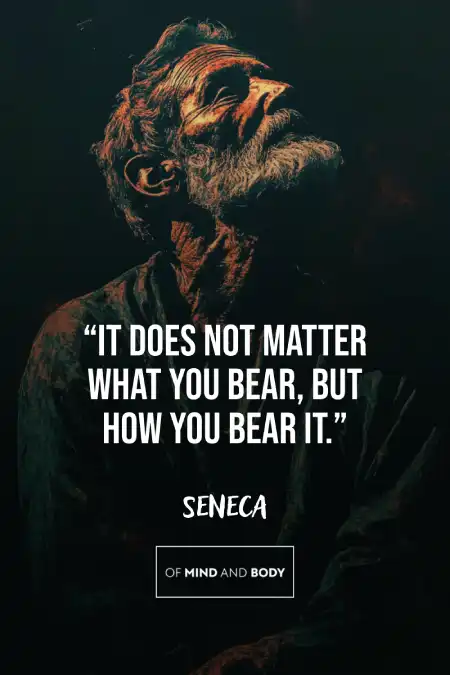
The Wisdom Behind the Words:
This Seneca quote reflects the Stoic view that life’s challenges are inevitable, but what truly defines a person is how they handle those difficulties. The wisdom here is in recognising that it’s not the severity of our burdens that matters, but our attitude and approach in facing them. Seneca highlights the importance of maintaining dignity, courage, and resilience in the face of adversity, which are the true markers of strength and virtue.
Modern-Day Application:
In modern life, this Seneca quote can be applied to personal and professional challenges, reminding us that our response to hardship defines us more than the hardships themselves. Whether dealing with loss, failure, or difficult circumstances, our ability to approach these moments with grace and composure is key to navigating them effectively. This mindset is empowering because it emphasises that we always have control over how we react, even if we can’t control the circumstances. This philosophy encourages resilience and personal responsibility in the face of life’s difficulties.
19.
“The greatest remedy for anger is delay.”

The Wisdom Behind the Words:
Seneca, like many Stoic philosophers, believed that anger clouds judgement and leads to irrational actions. The wisdom in this quote lies in the simple but powerful idea that by delaying our reaction, we give ourselves time to regain control, reflect, and respond more rationally. Anger, if left unchecked, can cause harm to ourselves and others, but with a brief pause, we can prevent its destructive consequences.
Modern-Day Application:
In today’s fast-paced world, where instant reactions are common—whether in personal interactions or online—this Seneca quote is a valuable reminder to practice emotional regulation. By taking a moment to breathe and reflect before responding in anger, we can prevent escalation and make more thoughtful decisions. This practice of delaying anger aligns with modern techniques like deep breathing, counting to ten, or walking away from heated situations to gain perspective. It promotes healthier relationships and personal peace by encouraging calm and measured responses rather than impulsive reactions.
20.
“No person has the power to have everything they want, but it is in their power not to want what they don’t have.”
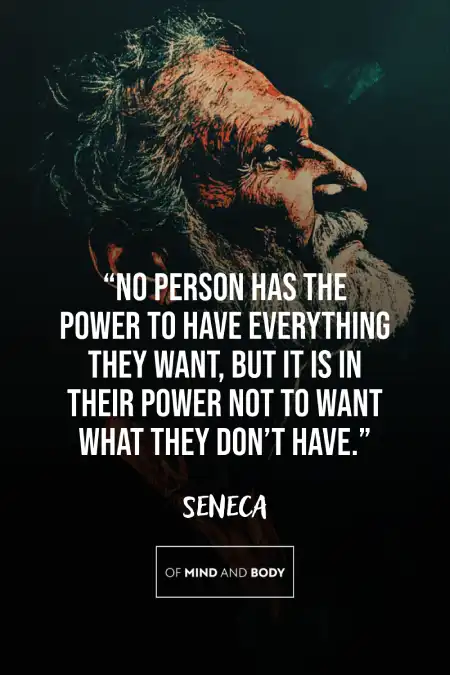
The Wisdom Behind the Words:
In this Seneca quote, he highlights the Stoic principle of controlling desires. The wisdom here lies in understanding that while external circumstances are often beyond our control, we do have the power to govern our desires. Contentment comes not from acquiring everything we want, but from moderating our desires and appreciating what we already have. By aligning our wants with what is available or reasonable, we find peace and avoid the suffering caused by unfulfilled desires.
Modern-Day Application:
In a society driven by consumerism and the constant pursuit of more, this Seneca quote offers a grounding perspective. It encourages us to practice gratitude for what we already have and to limit our desires for what we cannot attain. This mindset can reduce feelings of dissatisfaction, envy, and the pressure to constantly achieve or acquire more. Embracing minimalism, mindfulness, and gratitude are modern expressions of this philosophy, helping us find contentment in simplicity and appreciate the present rather than always longing for the next thing.
21.
“Difficulties strengthen the mind, as labour does the body.”
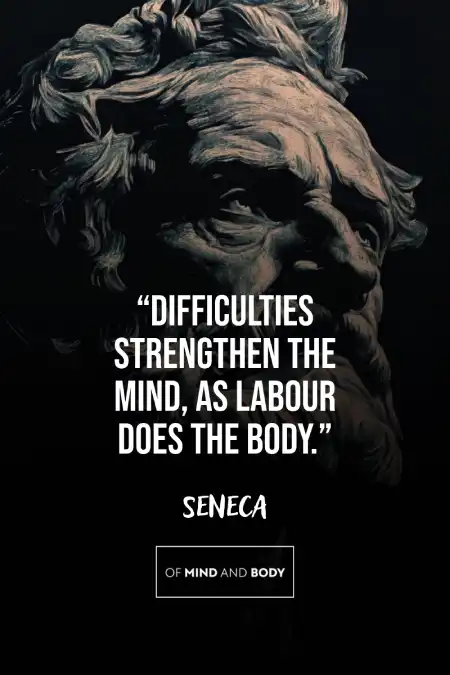
The Wisdom Behind the Words:
In this Seneca quote, he likens the mental benefits of overcoming difficulties to the physical benefits of labour. Just as physical exertion strengthens the body, challenges and hardships strengthen the mind, developing resilience, wisdom, and mental fortitude. The wisdom here is in recognising that adversity is not something to be avoided but embraced as an essential part of personal growth and mental development.
Modern-Day Application:
In today’s world, where people often try to avoid or minimise discomfort, this Seneca quote encourages us to see challenges as opportunities for mental strengthening. Whether it’s work-related stress, personal struggles, or difficult decisions, these experiences can make us stronger and more resilient. By approaching difficulties with a growth mindset, we can train our minds to be more resilient in the same way physical training strengthens our muscles. This approach helps us build mental endurance, allowing us to face future challenges with greater ease and confidence.
22.
“Anger, if not restrained, is frequently more hurtful to us than the injury that provokes it.”

The Wisdom Behind the Words:
Seneca warns against the destructive nature of uncontrolled anger. The wisdom in this quote is the understanding that anger, if left unchecked, can cause more harm than the initial offence or injury that triggered it. Unrestrained anger clouds judgement, damages relationships, and often leads to regretful actions. By restraining our anger, we protect ourselves from the emotional and psychological harm it can cause.
Modern-Day Application:
In today’s fast-paced and often stressful environment, this Seneca quote is a valuable reminder to practice emotional control. Anger is a natural emotion, but if we let it dominate our responses, it can create unnecessary conflict and harm. Techniques like mindfulness, deep breathing, or taking a moment to pause before reacting can help us restrain anger and respond more calmly. This approach reduces the negative impact of anger on ourselves and others, allowing for healthier, more productive interactions in both personal and professional settings.
23.
“If you really want to escape the things that harass you, what you’re needing is not to be in a different place but to be a different person.”

The Wisdom Behind the Words:
In this Seneca quote, he emphasises that true change comes from within, not from external circumstances. The wisdom here lies in the Stoic principle that we cannot always control our environment, but we can control our attitudes, thoughts, and reactions. If we want to escape what troubles us, we must focus on personal transformation rather than seeking to change our surroundings. Internal growth, rather than external changes, is the key to lasting peace and contentment.
Modern-Day Application:
In modern life, many people seek change by altering their jobs, locations, or relationships, hoping to escape stress or unhappiness. This Seneca quote serves as a reminder that lasting peace comes from within. Instead of constantly seeking external solutions, we should focus on self-improvement, emotional intelligence, and personal growth. By working on ourselves, we can change how we experience the world, making external circumstances less overwhelming. Practices like self-reflection, meditation, and personal development help foster the internal transformation needed to truly overcome life’s challenges.
24.
“Life is like a play: it’s not the length, but the excellence of the acting that matters.”
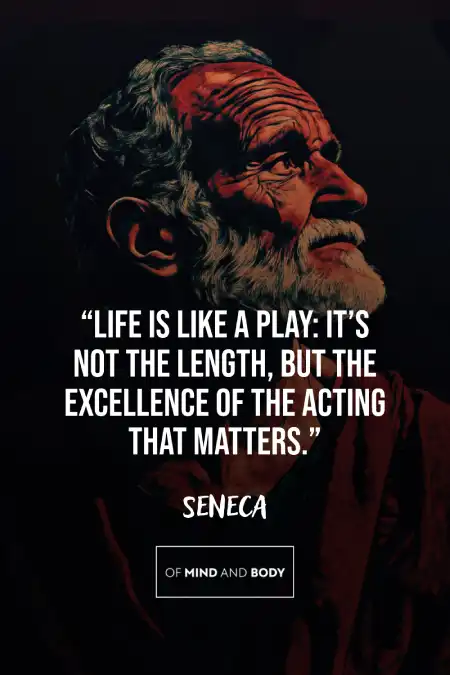
The Wisdom Behind the Words:
This Seneca quote uses the metaphor of life as a play to highlight the Stoic belief that the quality of one’s life is more important than its duration. The wisdom here is in recognising that living virtuously and purposefully is what truly matters, rather than the number of years one lives. A life lived with excellence—defined by integrity, kindness, and wisdom—holds far more value than a long life filled with trivial pursuits.
Modern-Day Application:
In today’s society, where longevity and the pursuit of external success are often prioritised, this Seneca quote reminds us to focus on the quality of our actions and choices. Instead of worrying about the length of life, we should strive to live with purpose, ensuring that our time is spent in meaningful ways. This could mean focusing on relationships, personal growth, or contributing positively to society. By emphasising excellence in how we live each day, we ensure that our life is fulfilling, regardless of its length.
25.
“Luck is what happens when preparation meets opportunity.”
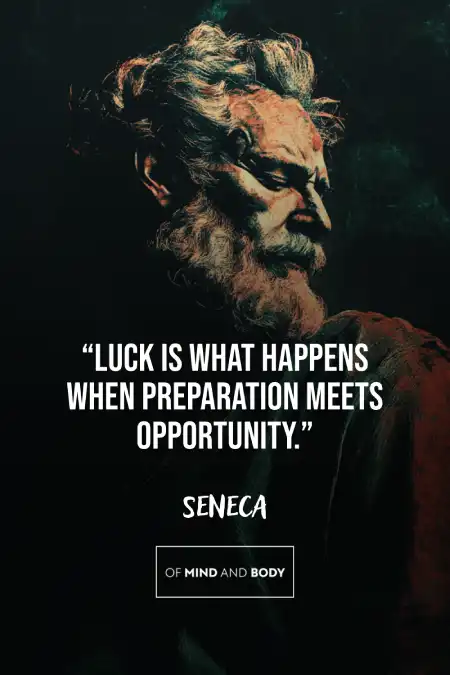
The Wisdom Behind the Words:
This Seneca quote highlights the importance of preparation in creating opportunities for success. The wisdom here lies in the understanding that what we often perceive as “luck” is the result of consistent effort, skill development, and readiness. Opportunities alone are not enough; it is the preparation that allows us to seize them effectively when they arise. This quote underscores the value of hard work and foresight in creating what appears to be “luck.”
Modern-Day Application:
In modern contexts such as career advancement, personal achievements, or creative pursuits, this Seneca quote reminds us that success is rarely a matter of pure chance. Those who are prepared—through education, practice, or skill-building—are more likely to capitalise on opportunities when they present themselves.
This mindset encourages continuous learning, strategic planning, and persistence, ensuring that when opportunities come, we are ready to take full advantage of them. Whether in business, sports, or personal growth, the combination of preparation and opportunity creates the conditions for success that others might simply call “luck.”
26.
“No man was ever wise by chance.”
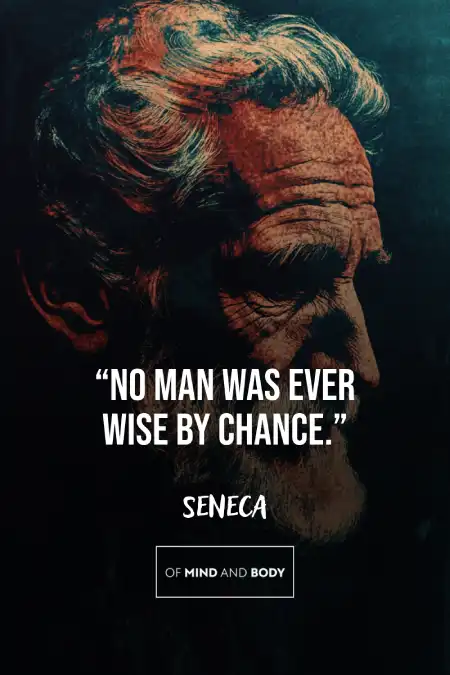
The Wisdom Behind the Words:
This Seneca quote emphasises that wisdom is not something that happens by accident; it is the result of intentional effort, learning, and reflection. The wisdom here lies in understanding that becoming wise requires deliberate practice, experience, and study. Wisdom comes from facing life’s challenges, making thoughtful decisions, and learning from mistakes. It is cultivated over time and cannot be obtained through luck or random events.
Modern-Day Application:
In the modern world, where instant results and shortcuts are often sought after, this Seneca quote reminds us that wisdom is a long-term pursuit. Whether in business, relationships, or personal growth, gaining wisdom requires patience, continuous learning, and reflection. By embracing the process of learning from life’s experiences, actively seeking knowledge, and refining our thinking, we can develop the wisdom necessary to navigate complex situations. This quote encourages us to invest time and energy in personal growth, knowing that wisdom is earned, not given.

27.
“What I advise you to do is, not to be unhappy before the crisis comes.”
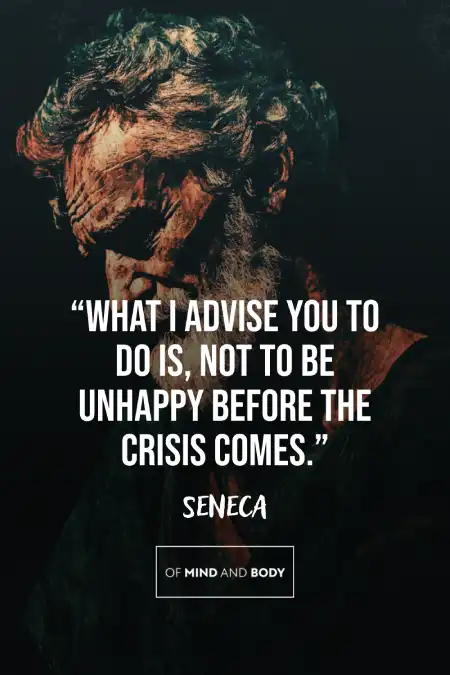
The Wisdom Behind the Words:
This Seneca quote advises against the common human tendency to worry about potential problems before they even happen. The wisdom here lies in recognising that preemptive unhappiness—anticipating crisis and suffering in advance—only leads to unnecessary distress. Seneca encourages us to live in the present moment and avoid creating additional suffering by worrying about events that may or may not occur.
Modern-Day Application:
In modern life, where people often experience anxiety about future challenges, this Seneca quote provides valuable insight. Worrying about crises that haven’t happened yet leads to emotional exhaustion and robs us of the present moment’s peace. Instead of letting future concerns dominate our thinking, we can practice mindfulness and focus on dealing with problems as they arise. By staying grounded in the present and managing emotions proactively, we can avoid unnecessary unhappiness and maintain a more balanced, calm state of mind.
28.
“Wild animals run from the dangers they actually see, and once they have escaped them worry no more. We however are tormented alike by what is past and what is to come.”

The Wisdom Behind the Words:
Seneca highlights the difference between humans and animals in how they handle fear and stress. While animals respond to immediate dangers and move on once they’ve escaped, humans often continue to be tormented by past experiences and future anxieties. The wisdom in this Seneca quote is the recognition that much of our suffering is self-inflicted, stemming from our inability to let go of the past and our tendency to worry excessively about the future.
Modern-Day Application:
In modern society, many people struggle with rumination—constantly replaying past events—and anxiety about the future. This Seneca quote reminds us to adopt a more animal-like approach to stress, addressing danger or challenges when they arise and then moving forward without unnecessary worry.
Practices like mindfulness, meditation, and cognitive behavioural therapy can help us break the cycle of dwelling on past mistakes or future uncertainties. By learning to let go of what we cannot control, we can free ourselves from unnecessary mental suffering and live more peacefully.
29.
“True happiness is… to enjoy the present, without anxious dependence upon the future.”
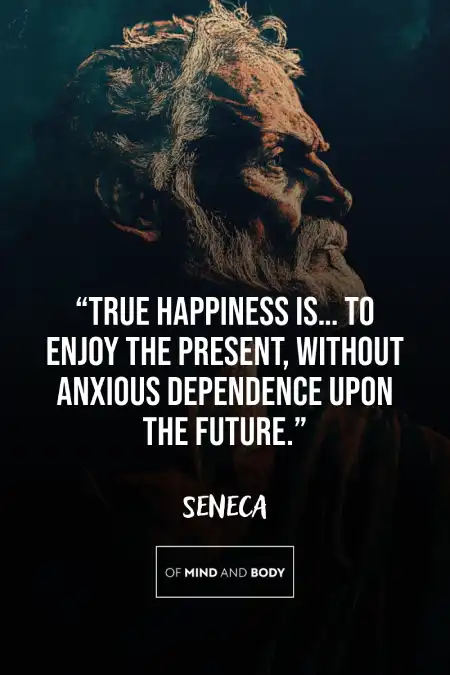
The Wisdom Behind the Words:
In this Seneca quote, he defines true happiness as the ability to find joy in the present moment without relying on future outcomes for contentment. The wisdom here lies in the Stoic belief that the present is the only moment we truly have control over, and true happiness comes from appreciating it without attaching ourselves to future desires or anxieties. This focus on the present prevents us from being trapped in a cycle of always waiting for future events to bring happiness.
Modern-Day Application:
In a world where many people tie their happiness to future achievements or goals, this Seneca quote encourages us to cultivate mindfulness and contentment in the present moment. Rather than constantly seeking happiness in future success, relationships, or material gains, we can learn to appreciate what we have right now.
Practices like gratitude journaling, mindfulness meditation, and intentional living help foster this mindset, allowing us to experience happiness as a state of being rather than something contingent on future events.
30.
“But life is very short and anxious for those who forget the past, neglect the present, and fear the future.”
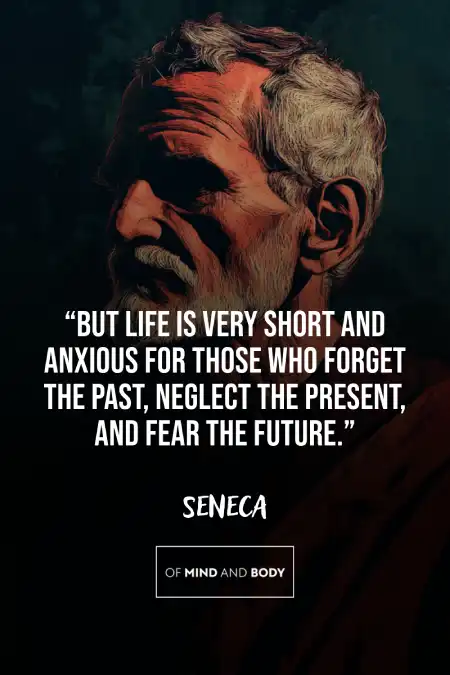
The Wisdom Behind the Words:
This Seneca quote offers a powerful reflection on the nature of time and anxiety. He warns that life becomes short and full of worry when we fail to live mindfully in the present. The wisdom here is that a fulfilling life requires balance—acknowledging the past without being stuck in it, fully engaging in the present, and not fearing what the future holds. Seneca encourages us to live consciously, without being weighed down by regrets or anxiety.
Modern-Day Application:
In today’s fast-paced world, where stress about the future and regret over the past are common, this Seneca quote is a reminder to focus on the present moment. Many people experience the feeling of time slipping away due to constant worry and distraction. By practicing mindfulness, we can avoid the trap of dwelling on past mistakes or fearing the unknown future. Living intentionally, appreciating the present, and maintaining perspective on time can help reduce anxiety and make life feel more meaningful and rich, even in its brevity.
FAQs
What did Seneca say about life?
Seneca believed that life should be lived with purpose and mindfulness, emphasizing that its quality, not length, matters most. One of his famous quotes about life is: “Life is long if you know how to use it.” He often reminded us that wasting time on trivial matters and distractions diminishes the richness of life, urging people to focus on what is meaningful and virtuous.
What is the quote by Seneca about suffering?
One of Seneca’s well-known quotes about suffering is: “We are more often frightened than hurt; and we suffer more from imagination than from reality.” In this quote, Seneca teaches that much of our suffering comes from our minds—our fears and anxieties about potential pain—rather than the actual experience itself.
What did Seneca say when he died?
Seneca, following the orders of Emperor Nero to take his own life, reportedly faced death with calmness and Stoic composure. He is said to have told his friends not to grieve for him, as his life’s philosophy had prepared him for this moment. While his exact final words are not definitively recorded, his actions reflected his Stoic belief in accepting fate with dignity.
What is Seneca’s advice?
Seneca’s advice consistently revolves around living virtuously, controlling your desires, and focusing on the present. He advised people to use their time wisely, pursue wisdom, and cultivate inner strength. A central piece of advice is: “It is not that we have a short time to live, but that we waste a lot of it.” This reflects his belief in making the most of our limited time on earth.
What is the most famous essay by Seneca?
Seneca’s most famous essay is likely “On the Shortness of Life” (De Brevitate Vitae), where he explores the concept of time, arguing that life is only short if we misuse it. In this essay, he urges readers to focus on meaningful pursuits and not squander time on distractions or trivial matters.





